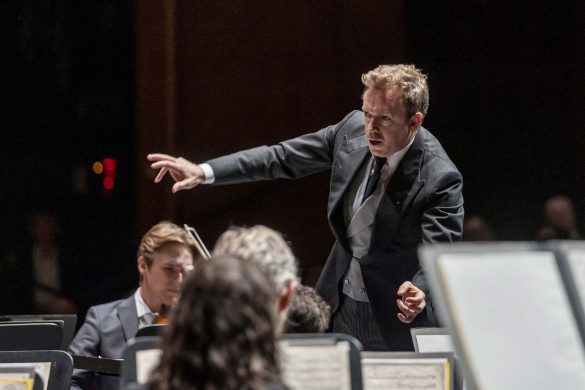
 Austria Salzburg Festival 2023 [8] – Ligeti and R. Strauss: Vienna Philharmonic Orchestra / Daniel Harding (conductor). Grosses Festspielhaus, Salzburg, 21.8.2023. (MB)
Austria Salzburg Festival 2023 [8] – Ligeti and R. Strauss: Vienna Philharmonic Orchestra / Daniel Harding (conductor). Grosses Festspielhaus, Salzburg, 21.8.2023. (MB)

Ligeti – Atmosphères; Lontano
R. Strauss – Metamorphosen; Also sprach Zarathustra, Op.30
This excellent programme and performance from the Vienna Philharmonic and Daniel Harding, substituting without change of a single piece for Franz Welser-Möst, paired two works by Ligeti, whose centenary we celebrate this year, with two by Richard Strauss, always a Salzburg favourite (and, of course, one of the Festival’s founders). One could doubtless strain to draw comparisons between the two composers. (I once divined some ‘elective affinities’ between them and Debussy for a programme note covering a highly unusual menu of Jeux, Schlagobers and Melodien.) But whilst such points naturally present themselves in real-time experience, it would be stretching things to say the two had much in common other than fantastic technique. The contrasts worked well, though, in a concert whose only real fault was a strangely lukewarm audience. Perhaps they did not much care for Ligeti, but they seemed almost as undemonstrative for Metamorphosen. My suspicion is it had more to do with Welser-Möst’s withdrawal, yet Harding marked, if anything, an upgrade (at least for me).
The two Ligeti works, both ‘for large orchestra’, made for interesting complement and contrast in themselves. Atmosphères, from 1961, made for a tremendous opener, presenting a universe, or perhaps even universes, like no other. Teeming with music, with life, with possibility, like the introduction to a Haydn symphony, it seemed to incorporate sounds that it actually did not: one of those experiences in which one could swear one has heard electronics, only to find one has not. This performance at times seemed almost granitic, as if Otto Klemperer were the guest at the feast, if you can imagine such a thing. It was febrile, yes, but also monumental.
Lontano (1967) offered the third in a series of four unforgettable orchestral openings — and paths taken. Yet more worlds opened up, some glimpsed only fleetingly, at least for now, though one fancied one might revisit. Life, again, seemed to be the operative concept. Every sound was somehow both familiar and unfamiliar, in spontaneous yet deeply considered generation. Harding built the performance with selfless skill; there was unquestionable drama here, but Ligeti’s, not his. Oddly, in context, the low bass line seemed to presage the all-too-celebrated opening of Also sprach Zarathustra: difficult to know what to make of that, yet intriguing.
For that sense of drama also proved a guiding thread. If the first section of Strauss’s symphonic poem sounded a little brash, it was also similarly brimming with potential. It offered generous scope for contrast too, eagerly accepted, not least in the gorgeously sweet string tone of what followed. Nietzsche generally seems a bit of a red herring to me here, save for a general materialism, but there was certainly a sense of positivity, of the need to say ‘yes’ to another new world. Whatever my doubts concerning the opening, doubts that may concern the work at least as much as its performance, this was an eminently musical account, which, again in context, seemed to speak of and through a rich process of metamorphosis. It danced well, and Harding whipped up a fine head of orchestral steam when called upon. If he lingered a little toward the close, one can hardly blame him. Strauss, after all, does that too.
That leaves Metamorphosen itself, heard between the two Ligeti pieces. There was no doubt whatsoever here that this was a piece ‘for 23 solo strings’, Harding their genial enabler, with none of, say, Karajan’s autocracy. That does not mean form could not be heard and felt, quite the contrary; it emerged from a sense of collegial chamber performance. The beginning was a little on the slow side, I think, yet it did not drag; rather, it spoke of genuine grief, soon inflected by finely etched chiaroscuro in harmony, texture, and narrative as much as in dynamic contrasts. Inner workings of great complexity were revealed, so as duly to rival Ligeti. Patience was the key to Strauss’s great outpouring, its quiet devastation emerging from within.
Mark Berry
